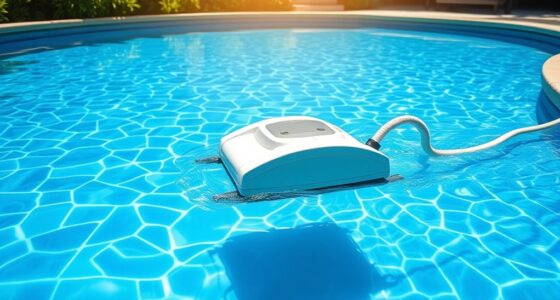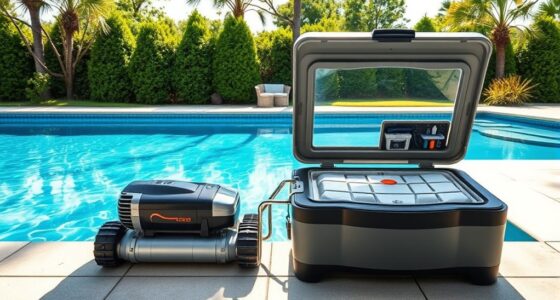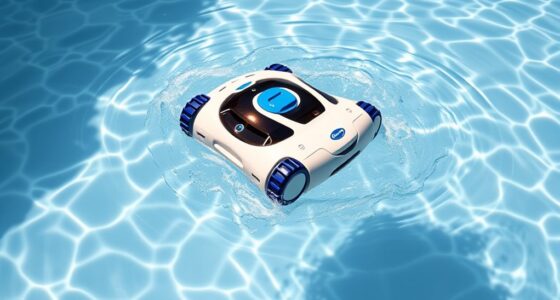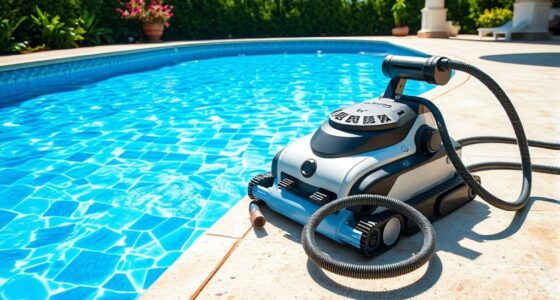Choose ammonia-based cleaners for tough jobs like heavy grime, grease, and stubborn smudges on large glass surfaces, but guarantee good ventilation and avoid coated or tinted glass. For quick, streak-free touch-ups on delicate or coated surfaces, alcohol-based cleaners work best and evaporate quickly. Depending on your situation, selecting the right cleaner can make your task easier and safer. Keep exploring to discover tips that will help you achieve perfect glass clarity.
Key Takeaways
- Use ammonia-based cleaners for heavily soiled, greasy, or smudged large windows needing deep cleaning.
- Choose alcohol-based cleaners for quick, streak-free shines on delicate or coated glass surfaces.
- Ensure proper ventilation when using ammonia cleaners due to strong fumes; alcohol cleaners evaporate faster with less odor.
- Avoid ammonia on tinted or coated glass to prevent damage; alcohol cleaners are safer for such surfaces.
- Select the cleaner based on dirt level and surface sensitivity to optimize cleaning efficiency and safety.

Are you tired of streaky, dull glass surfaces? Finding the right cleaner can make a huge difference in achieving crystal-clear results. Two popular options are ammonia-based and alcohol-based glass cleaners, but knowing when to use each can help you get the best shine without hassle. Choosing between them depends on the specific cleaning situation and the type of glass you’re tackling.
Ammonia-based cleaners are highly effective at cutting through grime, grease, and fingerprints. They’re especially good for large, smudged windows or glass surfaces that have accumulated stubborn dirt. Ammonia’s strong alkaline properties dissolve dirt quickly, leaving your glass streak-free and sparkling. However, they can emit strong fumes, so good ventilation is essential when using them. If you’re cleaning windows indoors, make sure to open windows or turn on exhaust fans to avoid irritation or breathing issues. Also, avoid using ammonia on tinted glass or surfaces with coatings, as it can cause damage or discoloration. For general cleaning of glass surfaces with stubborn stains, ammonia-based cleaners are your go-to.
On the other hand, alcohol-based cleaners are gentler but still highly effective at removing smudges, fingerprints, and light dirt. They evaporate quickly, which minimizes streaks and leaves a clean, shiny finish. Alcohol cleaners are ideal for quick touch-ups or when you want to avoid the strong fumes associated with ammonia. They’re also safer to use on delicate glass surfaces or those with special coatings, making them versatile for different types of glass. Since alcohol dries fast, you won’t need to worry about lingering moisture or streaks. This makes alcohol-based cleaners perfect for surfaces that require a quick, spotless shine, like glass tabletops or mirrors used frequently. If you’re dealing with greasy fingerprints or want a fast, streak-free finish without harsh fumes, alcohol-based cleaners are your best choice.
Additionally, AI-powered tools can be utilized to optimize cleaning routines and ensure the most effective product selection based on surface type and dirt level.
Frequently Asked Questions
Are There Eco-Friendly Glass Cleaners Without Ammonia or Alcohol?
Yes, you can find eco-friendly glass cleaners that don’t contain ammonia or alcohol. Look for brands that use natural ingredients like plant-based surfactants, vinegar, or citrus extracts. These products are biodegradable, non-toxic, and safe for the environment. Always check labels for eco-certifications or green seals, and consider making your own cleaner at home with simple ingredients like vinegar and water for a cost-effective, eco-friendly solution that works well.
Can Glass Cleaners Damage Tinted Windows or Screens?
Yes, glass cleaners can damage tinted windows or screens. Harsh chemicals like ammonia and alcohol can strip away tint films or cause screens to peel or discolor. You should avoid using strong cleaners on tinted surfaces. Instead, opt for gentle, ammonia-free, and alcohol-free formulas specifically designed for delicate glass and screens. Always test a small area first to prevent any potential damage and keep your windows or screens looking pristine.
How Do I Remove Streaks Caused by Glass Cleaners?
To remove streaks caused by glass cleaners, start by wiping the surface with a clean, lint-free cloth dampened with plain water. Gently buff the area in circular motions to lift residual cleaner. If streaks persist, try using a mixture of equal parts water and vinegar, then dry with a fresh microfiber cloth. Avoid harsh scrubbing, and always test on a small, hidden area first.
Are Homemade Glass Cleaning Solutions Effective and Safe?
Homemade glass cleaning solutions can be effective and safe if you use the right ingredients. Mix equal parts water and white vinegar or add a few drops of dish soap to water for a gentle cleaner. These options are non-toxic, cost-effective, and environmentally friendly. However, avoid using abrasive materials or excessive vinegar, which can damage surfaces. Always test a small area first to guarantee safety and effectiveness.
What Are the Health Risks of Long-Term Exposure to Ammonia or Alcohol?
Long-term exposure to ammonia can cause respiratory issues, skin irritation, and eye damage, especially if you work with it regularly without proper protection. Alcohol exposure over time might lead to skin dryness, irritation, and potential liver or kidney strain if inhaled or absorbed through your skin in large amounts. To protect yourself, always use gloves, guarantee good ventilation, and limit prolonged contact with these chemicals.
Conclusion
When choosing between ammonia and alcohol-based glass cleaners, consider your specific needs. For instance, if you want a streak-free shine on your windows, an alcohol-based cleaner might be your best bet. Imagine Sarah, who switched to alcohol cleaner and now enjoys spotless glass every time. Ultimately, understanding your cleaning priorities helps you pick the right product. So, try both if needed, and find what works best for your home’s clarity and shine!








